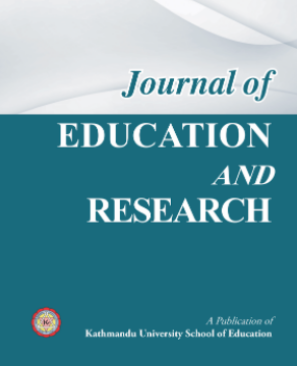
A Shift in Discourse Towards ‘Public Understanding of Sustainability Science’ (PUSS)
Original Article
Journal of Education and Research, Volume 12, Issue 1, 2022, 57-86, https://doi.org/10.51474/jer.v12i1.594
Publication date: Jun 15, 2022
Views: 483 | Downloads: 222
How to cite this article
APA
In-text citation: (Atchia, 2022)
Reference: Atchia, S. M. C. (2022). A Shift in Discourse Towards ‘Public Understanding of Sustainability Science’ (PUSS). Journal of Education and Research, 12(1), 57-86. https://doi.org/10.51474/jer.v12i1.594
Reference: Atchia, S. M. C. (2022). A Shift in Discourse Towards ‘Public Understanding of Sustainability Science’ (PUSS). Journal of Education and Research, 12(1), 57-86. https://doi.org/10.51474/jer.v12i1.594
Vancouver
In-text citation: (1), (2), (3), etc.
Reference: Atchia SMC. A Shift in Discourse Towards ‘Public Understanding of Sustainability Science’ (PUSS). Journal of Education and Research. 2022;12(1):57-86. https://doi.org/10.51474/jer.v12i1.594
Reference: Atchia SMC. A Shift in Discourse Towards ‘Public Understanding of Sustainability Science’ (PUSS). Journal of Education and Research. 2022;12(1):57-86. https://doi.org/10.51474/jer.v12i1.594
AMA
In-text citation: (1), (2), (3), etc.
Reference: Atchia SMC. A Shift in Discourse Towards ‘Public Understanding of Sustainability Science’ (PUSS). Journal of Education and Research. 2022;12(1), 57-86. https://doi.org/10.51474/jer.v12i1.594
Reference: Atchia SMC. A Shift in Discourse Towards ‘Public Understanding of Sustainability Science’ (PUSS). Journal of Education and Research. 2022;12(1), 57-86. https://doi.org/10.51474/jer.v12i1.594
Chicago
In-text citation: (Atchia, 2022)
Reference: Atchia, Shakeel Mohammad Cassam. "A Shift in Discourse Towards ‘Public Understanding of Sustainability Science’ (PUSS)". Journal of Education and Research 2022 12 no. 1 (2022): 57-86. https://doi.org/10.51474/jer.v12i1.594
Reference: Atchia, Shakeel Mohammad Cassam. "A Shift in Discourse Towards ‘Public Understanding of Sustainability Science’ (PUSS)". Journal of Education and Research 2022 12 no. 1 (2022): 57-86. https://doi.org/10.51474/jer.v12i1.594
Harvard
In-text citation: (Atchia, 2022)
Reference: Atchia, S. M. C. (2022). A Shift in Discourse Towards ‘Public Understanding of Sustainability Science’ (PUSS). Journal of Education and Research, 12(1), pp. 57-86. https://doi.org/10.51474/jer.v12i1.594
Reference: Atchia, S. M. C. (2022). A Shift in Discourse Towards ‘Public Understanding of Sustainability Science’ (PUSS). Journal of Education and Research, 12(1), pp. 57-86. https://doi.org/10.51474/jer.v12i1.594
MLA
In-text citation: (Atchia, 2022)
Reference: Atchia, Shakeel Mohammad Cassam "A Shift in Discourse Towards ‘Public Understanding of Sustainability Science’ (PUSS)". Journal of Education and Research, vol. 12, no. 1, 2022, pp. 57-86. https://doi.org/10.51474/jer.v12i1.594
Reference: Atchia, Shakeel Mohammad Cassam "A Shift in Discourse Towards ‘Public Understanding of Sustainability Science’ (PUSS)". Journal of Education and Research, vol. 12, no. 1, 2022, pp. 57-86. https://doi.org/10.51474/jer.v12i1.594
ABSTRACT
Science represents the body of knowledge which has been shaping the world, and it forms the basis of every discipline ranging from the core science to philosophy. Fundamentally, the understanding of science is two-fold, where one is related to the science of the common people while the other is related to high-order scientific ideas, theories, and research. In this era of the fourth industrialisation, the challenge is not limited to the training of top scientists but to making science accessible to every one by bringing science to the lay public. This is where the ‘Public understanding of sustainability science (PUSS)’ represents a key concept as it aims at transforming the lay public into informed citizens with the appropriate knowledge, know-how, skills, attitudes, and values required to understand and face current and future challenges such as the energy crisis, climate change, emergence, and re-emergence of new epidemics, using an integrated approach. The ‘Public Understanding of Science (PUS)’, as a dimension, originated during the late 1980s from the concept of ‘science literacy’ as a response to the public deficit discourse at that time, where the focus of science was shifting from knowledge to attitudes. And during the last decade, the public deficit discourse on trust deficiency shifted the paradigm from PUS to ‘science in-and-of society’. However, today the discourse has reached a new dimension where the public trust deficit is already being questioned and challenged. As a response to such discourse, this case study analysed the current public interrogations and challenges using the ‘co-production of knowledge model’ with the lens of the public deficit theory to better prepare the public to face current and future challenges. Consequently, the PUSS has been identified as the new paradigm to address the current public deficits.
REFERENCES
---
LICENSE
This work is licensed under a Creative Commons Attribution 4.0 International License.
